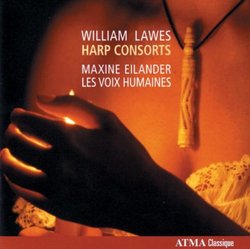| All Artists: William Lawes, Les Voix Humaines Title: Lawes: The Harp Consorts Members Wishing: 0 Total Copies: 0 Label: Atma Classique Original Release Date: 1/1/2008 Re-Release Date: 8/26/2008 Genre: Classical Styles: Chamber Music, Historical Periods, Classical (c.1770-1830) Number of Discs: 1 SwapaCD Credits: 1 UPC: 722056237222 |
Search - William Lawes, Les Voix Humaines :: Lawes: The Harp Consorts
CD Details |
CD ReviewsObscure but excellent Jim Shine | Dublin, Ireland | 10/02/2008 (5 out of 5 stars) "I suppose you could view this music as a first cousin of the viol consort - here we have 2 violas da gamba, violin, harp and theorbo. Lawes was one of the leading composers in the time of Charles I; he died in his early forties, having been fatally wounded at the siege of Chester (his older brother Henry outlived him by 17 years). This is the first complete recording of the 11 harp consorts, and in fact Arkivmusic lists only a single other perfomance of one of them. The reason for this fine music's neglect is the difficulty of dealing with the source material; in his booklet notes, theorbo player Stephen Stubbs goes into detail on what had to be reconstructed, and also on the decision as to whether an Irish harp or a triple harp should be used (the latter, it turns out). The 11 consorts are organized as follows: numbers 1 to 6 are suites of dances, generally along the lines of Air or Allemande, a pair of Courantes, and a Sarabande; number 7 is a short Air on its own; numbers 8 to 10 each consist of a Pavane and divisions; and number 11 is a Fantazy. Always my big concern with music of this period is whether it can stand up to sustained listening - will it get too samey after half an hour? No worries here. For a start, the pieces are grouped on the disc not in numerical order but by key - there are 3 each in G major, G minor, and D major, and 2 in D minor. This gives a unity of mood while maintaining a variety in the music. And there is plenty of variety here, the dance suites in particular giving Lawes plenty of scope and allowing him to show off some catchy tunes. The Sarabandes in particular caught my ear, and throughout one can revel in the warmth of the sound. The other significant factor in the disc's success is, of course, the musicians. Les Voix Humaines, in the form of gambists Susie Napper and Margaret Little, have a fine catalogue for Atma, and presumably Stephen Stubbs needs no introduction to anyone with an interest in baroque music; violinist David Greenberg is a name I've seen in other recordings (he also plays fiddle), and although I'd not heard of Maxine Eilander, in my defense I'll admit to not having much (well, any) harp music in my collection. (Incidentally, this music isn't harp-plus-consort - the harp is very much part of the team). This excellent disc is capped off by a pleasant dessert in the form of a duo for 2 lutes, here performed on harp and baroque guitar. For anyone with an interest in Lawes or music of the period, the disc is pretty much self-recommending, and if you're a newcomer to this particular byway, it's an excellent place to start." Music you dance to with the one you love Tym S. | San Francisco, CA USA | 09/05/2008 (4 out of 5 stars) "This is the first complete recording of the 17th century composer's reknowned and beautiful harp consorts. Composed for the court of Charles I, these elegant waltzes are bright with the interplay of harp and violin over violas and guitar. They are propulsive for the feet while swirling in a deft and delicate romanticism. This is music you dance to with the one you love, under a clear indigo sky.
Lawes was killed, followed by his king, in the English Civil War. His legacy was almost lost to the ages from that lack of disciples and the long frown of disfavor for his use of innovative, odd counterpoints. Recent years have shone new light on him. This volume is a great record of the warmth and incandescence of his work, particularly in the skills of front players Maxine Eilander (harp) and David Greenberg (baroque violin). Lacing it and expanding it are the subtle sureness of Stephen Stubbs (theorbo and guitar) and 'Le Voix Humaines', Susie Napper and Margaret Little (violas). A labor of love full of lovely music." |

